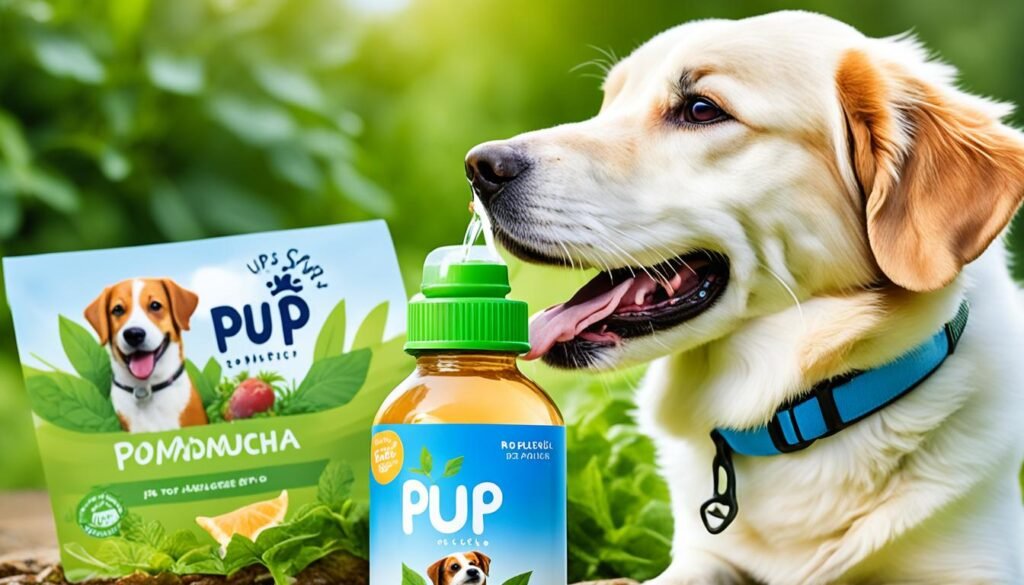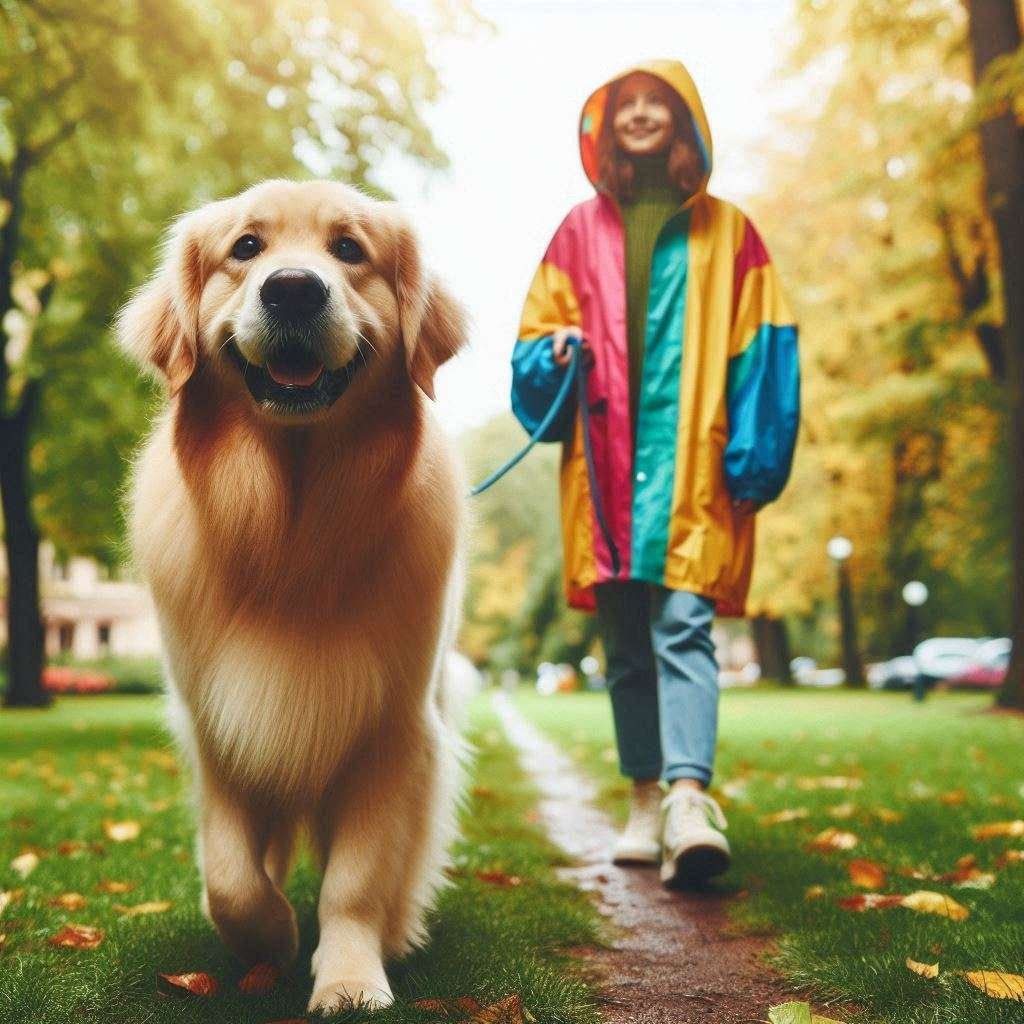Kombucha is a fermented tea drink that’s getting popular for its health perks. Dog owners want to give their pets the best, so they ask: is kombucha safe for dogs? or Can Dogs Drink Kombucha? This guide looks into whether dogs can have kombucha. It talks about the good points and things to watch out for when adding this drink to your dog’s diet.

Key Takeaways
- Kombucha is a fermented tea beverage rich in probiotics, antioxidants, and other beneficial nutrients.
- Dogs metabolize nutrients differently from humans, requiring caution when considering kombucha for canine consumption.
- Limited scientific data on the effects of kombucha on dogs highlights the need for veterinary guidance before incorporation.
- Potential benefits of kombucha for dogs include supporting gut health, immune function, and liver detoxification.
- Proper modification and monitoring are crucial when offering kombucha or scoby treats to dogs to ensure safety and well-being.
What is Kombucha and Its Health Benefits
Kombucha is a fermented tea drink that’s getting popular for its health perks. It’s made by adding a SCOBY (Symbiotic Culture of Bacteria and Yeast) to sweet tea. This lets it ferment for a few days. The drink then becomes full of probiotics, antioxidants, and other good stuff.
Kombucha is a Fermented Tea Beverage
The fermentation turns the sugary tea into a fizzy, slightly sour drink. The SCOBY eats the sugar and turns it into acids like acetic acid. These acids make kombucha taste tangy.
Packed with Probiotics and Antioxidants
- Kombucha is full of good probiotic bacteria like Lactobacillus and Acetobacter. These help keep your gut healthy.
- It also has antioxidants, such as polyphenols. These can fight off harmful free radicals and lessen oxidative stress.
Antimicrobial and Blood Sugar Management Properties
Kombucha’s acetic acid helps stop bad bacteria from growing. It might also slow down how fast sugars get absorbed and digested. This could help manage blood sugar for people with diabetes or prediabetes.
| Kombucha Health Benefits | Supporting Evidence |
|---|---|
| Gut Health | Kombucha may improve pets’ gut health by supporting a healthy digestive system. |
| Skin and Coat Health | Adding Kombucha to pet food or water can result in shinier coats and more consistent bowel movements. |
| Antimicrobial Properties | Kombucha serves as an antimicrobial and can prevent unpleasant odors in pets, leaving them smelling fresh. |
| Liver Detoxification | Glucuronic acid in kombucha aids liver detoxification by binding to toxins and expelling them from the body. |
“Kombucha is a powerful fermented beverage that can offer a range of health benefits, from supporting gut health to promoting overall wellbeing.”
Can Dogs Drink Kombucha? Exploring the Pros and Cons
Kombucha is known for its health benefits for humans, but its safety and effectiveness for dogs is still being studied. This fermented tea has probiotics, antioxidants, and other compounds that could help dogs. But, dogs process these substances differently than humans, which can be risky.
Potential Benefits of Kombucha for Dogs:
- Supports a healthy gut microbiome with its probiotic content
- Boosts the immune system and reduces inflammation
- May aid in liver detoxification and overall wellness
Potential Risks of Kombucha for Dogs:
- Caffeine can make dogs more restless and even cause seizures
- Some kombucha has sugar, which can lead to weight gain and health problems
- Alcohol in kombucha can be harmful to dogs because they can’t break it down well
Deciding if kombucha is right for your dog should be talked over with a vet. You need to think about your dog’s health, what they need to eat, and how they react to kombucha. Always start with a little bit and watch your dog for any bad reactions.
Kombucha might be good for dogs, but we don’t know much about it yet. Adding new foods or drinks to a pet’s diet should always put their safety first. By talking to a vet and starting with a little bit, you can try kombucha safely.
Potential Benefits of Kombucha for Dogs
Kombucha is more than just a tasty drink for humans; it could be good for dogs too. It’s full of probiotics, antioxidants, and other important nutrients. These can help keep a dog healthy in many ways.
Supports Healthy Gut Microbiome
Kombucha has lots of probiotics. These are good bacteria and yeast that keep a dog’s gut balanced. A healthy gut is key for good digestion, absorbing nutrients, and fighting off sickness.
Boosts Immune System and Reduces Inflammation
Kombucha is full of antioxidants like polyphenols and vitamin C. These can lower inflammation in dogs. This might make their immune system stronger and help them stay healthy.
Aids in Liver Detoxification
Kombucha has nutrients good for dogs, like B vitamins, vitamin C, enzymes, and beneficial bacteria. These can help the liver clean out bad stuff.
Even though kombucha could be good for dogs, we need more studies to be sure. Always talk to a vet before giving kombucha to your dog.
| Benefit | Description |
|---|---|
| Gut Health | Kombucha is rich in probiotics, containing beneficial bacteria and yeast for a healthy gut flora in dogs. |
| Immune System | Kombucha is packed with antioxidants, such as polyphenols and vitamin C, which can help reduce inflammation and boost the immune system. |
| Liver Detoxification | Kombucha contains various nutrients, including B vitamins, vitamin C, enzymes, and beneficial bacteria, that may assist in the liver’s natural detoxification processes. |
Homemade Kombucha for Dogs: Brewing Process
If you’re a dog owner looking to add homemade kombucha to your pet’s diet, the brewing process is easy. With a few kombucha ingredients and the right brewing equipment, you can make kombucha for dogs at home.
Ingredients and Equipment Needed
- Black or green tea
- Sugar
- A kombucha culture (SCOBY)
- Starter tea (previously brewed kombucha)
- A glass jar or vessel for fermenting
- A cloth or breathable cover for the jar
- A rubber band to secure the cover
Step-by-Step Brewing Instructions
- Bring water to a boil and steep the tea for 5-7 minutes.
- Dissolve the sugar in the hot tea until fully incorporated.
- Allow the tea to cool to room temperature.
- Once cooled, pour the tea into a clean, sterilized glass jar.
- Add the SCOBY and starter tea to the jar.
- Cover the jar with a cloth and secure it with a rubber band.
- Ferment the kombucha for 7-14 days, depending on your desired taste and carbonation level.
- Once fermented, transfer the kombucha to bottles and refrigerate for storage.
By following these simple steps, you can make a batch of homemade kombucha for dogs they’ll love. Just remember to pay attention to the kombucha brewing process and adjust the ingredients as needed. This ensures your pup’s safety and health.

Modifying Kombucha for Dogs’ Safety
Kombucha can be great for dogs, but we must make sure it’s safe for them. It comes from fermenting tea leaves and has some caffeine. This can be bad for dogs.
Reducing Caffeine and Sugar Content
Dogs can’t handle caffeine well. Even a little can cause health problems. Giving them too much kombucha can lead to caffeine poisoning. So, we need to cut down the caffeine in their kombucha.
Also, some kombucha has a lot of sugar. Dogs don’t need that much sugar. We should make sure the kombucha we give them is low in sugar too.
Controlling Alcohol Levels
Kombucha has a bit of alcohol from fermenting. We must watch how much alcohol is in it for dogs. Too much alcohol is bad for dogs. So, we need to make sure the kombucha we give them is safe.
By changing the caffeine, sugar, and alcohol in kombucha, we can make it safe for dogs. This way, dogs can enjoy the health benefits without getting sick.
can dogs drink kombucha
No, dogs should not drink regular kombucha. It can be harmful to them. Kombucha has caffeine, sugar, and alcohol, which are bad for dogs.
But, you can make kombucha safe for dogs. By reducing the caffeine, sugar, and alcohol, dogs can still get the good stuff. This includes probiotics and antioxidants.
Potential Benefits of Kombucha for Dogs
- Supports a healthy gut microbiome
- Boosts the immune system and reduces inflammation
- Aids in liver detoxification
Always talk to a vet before giving kombucha to your dog. It’s important to introduce it slowly and watch how your dog reacts.
Risks of Kombucha for Dogs
- Caffeine toxicity
- Sugar overload
- Alcohol poisoning
Sharing kombucha with dogs might seem nice, but it’s not safe. There are better options for dogs that are also probiotic-rich and full of antioxidants.

So, it’s best to keep regular kombucha away from dogs. But, with the right changes and a vet’s advice, you can give your dog a special, safe version of kombucha.
Introducing Kombucha to Your Dog’s Diet
Before adding kombucha to your dog’s diet, talk to a vet. Some dogs might react badly to kombucha because of allergies or sensitivities. They could also have upset stomachs from new foods. Always watch how your dog acts when you add kombucha and start with a little to see how they handle it.
Monitoring for Allergies or Sensitivities
Watch for signs of allergies or sensitivities when you give kombucha to your dog. Look out for:
- Skin irritation or rashes
- Digestive issues like vomiting or diarrhea
- Changes in appetite or energy levels
If you see any of these signs, stop giving kombucha and talk to your vet right away. They can figure out what’s causing the problem and suggest other options.
Starting with Small Portions
Begin with a tiny bit of kombucha, like a teaspoon or two in their food. This helps their stomach get used to it slowly. Then, you can slowly add more over time, watching how they do.
It’s important to give the right amount of kombucha to prevent problems like upset stomach or dehydration. Your vet can tell you how much is right for your dog, based on their size, age, and health. With the right steps and watching your dog, kombucha can be good for them.
Creative Ways to Serve Kombucha to Dogs
If you’ve found out that kombucha is safe for your dog, there are many ways to add it to their diet. You can mix it with food or water, use it as a spray, or make chew treats from leftover SCOBY. These are just a few ideas.
Mixing with Food or Water
When adding kombucha to your dog’s food, don’t pour it over dry kibble. It can make the food clump. Instead, mix it into wet food, a mix of wet and dry food, or add it to their water. This way, your dog gets all the good stuff from the kombucha.
Using as a Topical Spray
Did you know you can use kombucha as a spray for your dog? It can help with skin problems and even keep fleas away. Fleas don’t like the acid in kombucha. Just mix it with water in a spray bottle and spray on your pet’s coat and skin.
Dehydrated SCOBY Chew Treats
If you have an old SCOBY from making kombucha, you can dry it out and make SCOBY dog treats. These treats are fun for your dog to eat and are good for their health too. They add more probiotics to their diet.
Adding kombucha to your dog’s diet in these ways can boost their health. Always start with a little bit and watch how they react to it first.
Conclusion
Kombucha can be good for dogs in some ways, like helping their gut and immune system, and cleaning their liver. But, there are big risks and things pet owners need to know. Things like caffeine, sugar, and alcohol in kombucha can hurt dogs if not watched closely.
This can cause things like a fast heart rate, high blood pressure, and seizures. It can also mess with the balance of good bacteria in their gut.
It’s very important to talk to a vet before giving kombucha to your dog. This makes sure it’s right for their health needs and watches for any bad reactions. Starting with a little bit and making the kombucha safer can help dogs enjoy it without harm.
The main points are to be careful, get expert advice, and watch how your dog acts with kombucha. With care and the right steps, kombucha can be a good drink for some dogs. But, it’s important to think about it carefully and make it safe for your pet.


